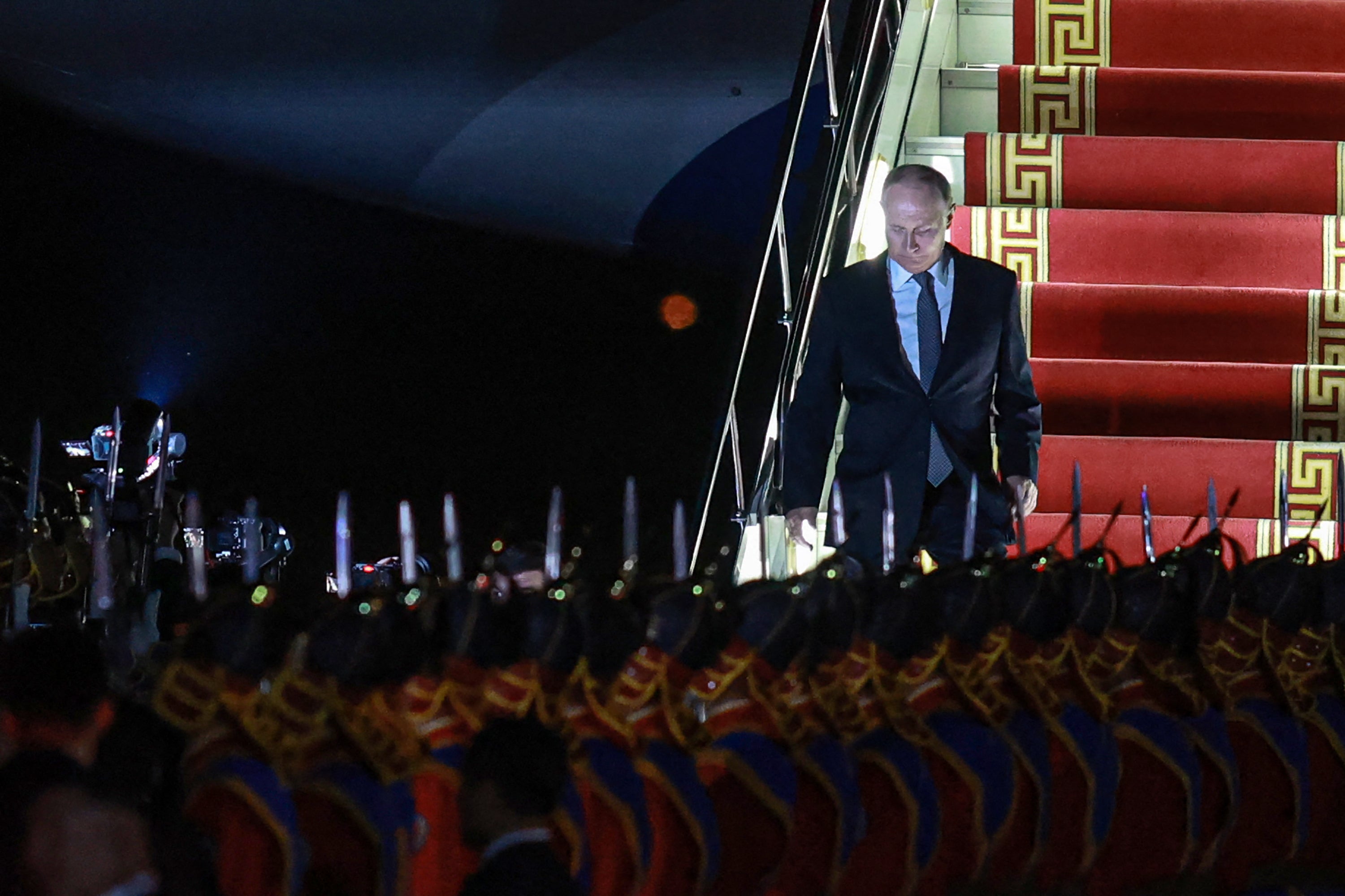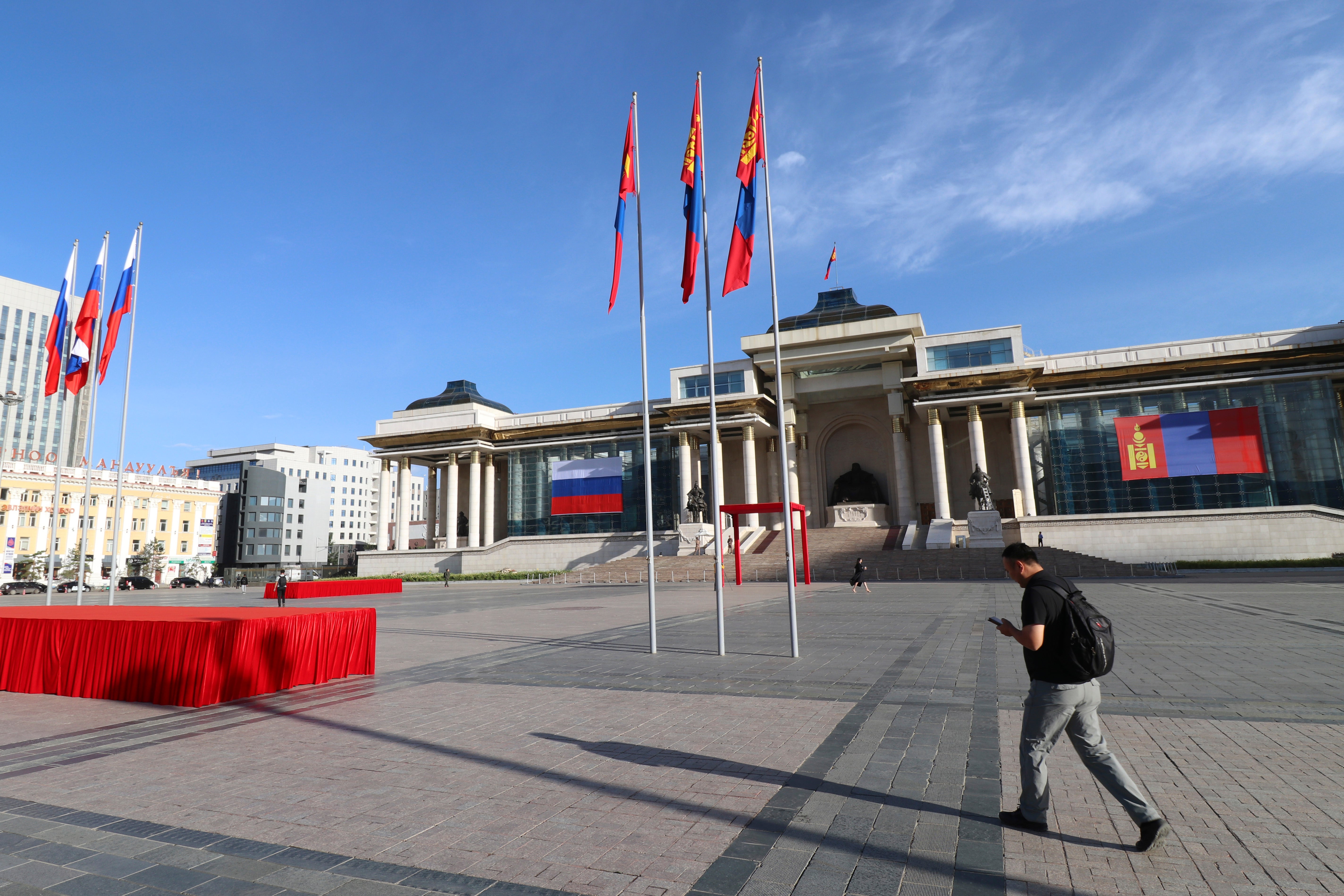Will Vladimir Putin be arrested in Mongolia?
Russian leader is making his first visit to an ICC member state since the world court issued a warrant for his arrest, and there are calls for Mongolia to detain him over alleged war crimes in Ukraine
Russian president Vladimir Putin received a red carpet welcome in Mongolia, appearing unfazed during his first trip to a member country of the International Criminal Court which has issued an arrest warrant for him for alleged war crimes in Ukraine.
A signatory to the Rome Statute governing the Hague court, Mongolia was called on by ICC, other countries, and human rights groups to oblige the warrant and arrest Mr Putin as he landed in the country.
Mr Putin was not arrested upon arrival, making Mongolia the first nation to openly defy the ICC warrant against the Russian leader. The Kremlin leader was, however, greeted by the Mongolian military guard at the airport and he spent the night in capital Ulaanbaatar.
Angered by the defiance of the international arrest warrant, Ukraine vowed to ensure Mongolia felt the consequences.
The Kremlin announced last week that Mr Putin would visit Mongolia to mark the 85th anniversary of the victory of Russian and Mongolian forces against Imperial Japan at Khalkhin Gol river in 1939.
The ICC issued an arrest warrant for Mr Putin in March 2023 after accusing him of committing war crimes by taking hundreds of Ukrainian children from orphanages during the war.
It accused Mr Putin and Russia’s children’s rights commissioner Maria Alekseyevna Lvova-Belova of “unlawful deportation” of children “from occupied areas of Ukraine to the Russian Federation”.
Before the trip, the Kremlin said it had "no worries" about Mr Putin’s impending visit. "We have an excellent rapport with our partners from Mongolia," Kremlin spokesperson Dmitry Peskov said. "Of course, all aspects of the president’s visit have been carefully prepared."
Mongolia, landlocked between Russia and China, is dependent on Moscow for imports of oil and natural gas. It assumed an important role as its strategic placement between the two allies allowed it to facilitate between them amid the threat of sanctions against Chinese firms for directly dealing with Russia.

The ICC and Ukraine had already pressed Mongolia to arrest Mr Putin at the weekend, and Human Rights Watch put its weight behind these calls on Monday.
“Mongolia would be defying its international obligations as an ICC member if it allows Russian president Vladimir Putin to visit without arresting him,” said Maria Elena Vignoli, senior international justice counsel at Human Rights Watch.
“Welcoming Putin, an ICC fugitive, would not only be an affront to the many victims of Russian forces’ crimes, but would also undermine the crucial principle that no one, no matter how powerful, is above the law,” she said.
Ukraine’s foreign ministry said it hoped Mongolia was “aware of the fact that Vladimir Putin is a war criminal” and urged it to arrest the Russian leader and hand him over to prosecutors at The Hague.
On Tuesday, it denounced Mongolia’s failure to detain Mr Putin as “a heavy blow to the ICC and the system of criminal law.
“Mongolia has allowed an accused criminal to evade justice, thereby sharing responsibility for the war crimes,” ministry spokesperson Heorhiy Tykhyi wrote on the Telegram messaging app.
Ukraine, he said, would work with its allies to ensure Mongolia felt the consequences.
The ICC does not have any enforcement mechanism and its agreement with member countries exempts them from the obligation of carrying out an arrest under certain circumstances.
For Mongolia, the practical consequences of a fallout with Moscow would likely be worse than the consequences of upsetting The Hague.
Mongolia receives 95 per cent of its petroleum products from Russia, accounting for 35 per cent of all imports.
The country’s economy, heavily focused on the export of raw materials such as coal, copper and gold, depends largely on Russian fuel for transport to China.
The talks are set to focus on a controversial new gas pipeline connecting Russia and China. Russia has been aiming to establish a new gas pipeline, Power of Siberia 2, to redirect Russian gas supplies that passed energy to Europe through Mongolia to reach China instead. However, expectations that it would be built have been thrown into doubt after Mongolia’s parliament did not include the pipeline in its next five year economic budget.
In the past five years, Russian exports to Mongolia have increased at a rate of 8.85 per cent a year, from $1.6bn in 2017 to $2.44bn in 2022, according to the Observatory of Economic Complexity. The exports include planes, helicopters and spacecraft.
When Russia banned fuel exports from 1 March 2024 it made exceptions for friendly nations such as India, China, and Mongolia.

Mr Putin last year avoided visiting ICC member country South Africa for the BRICS summit in Johannesburg.
President Cyril Ramphosa lobbied Moscow for months to keep Mr Putin from visiting in order to avoid a diplomatic crisis. He ultimately announced the two countries had reached a “mutual agreement” that the Russian leader would not attend a meeting that he’s normally a fixture at.
South Africa avoided a repeat of a similar controversy when it hosted Sudanese dictator Omar al-Bashir in 2015, who had arrest warrants against him, sparking condemnation for failing to fulfil its obligations to the ICC.
Mr Putin instead took part in the Johannesburg summit by video link, launching into a tirade against the West.
Join our commenting forum
Join thought-provoking conversations, follow other Independent readers and see their replies
Comments


Bookmark popover
Removed from bookmarks